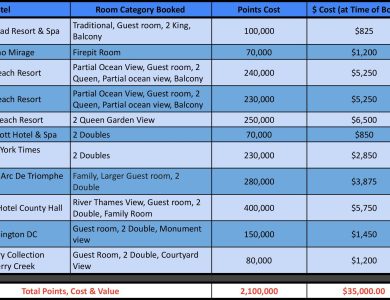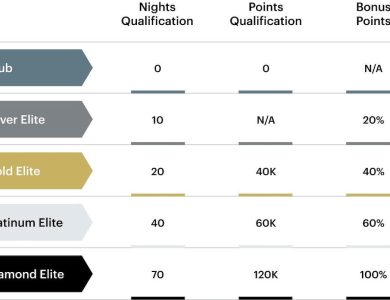
In recent years, loyalty programs have become a cornerstone of consumer engagement strategies across various industries, particularly in travel and hospitality. These programs offer customers the opportunity to accumulate points that can be redeemed for a range of benefits, from free flights to hotel upgrades. However, the allure of these rewards is often tempered by the imposition of blackout dates—periods during which points cannot be redeemed. This article seeks to analytically examine whether these blackout dates undermine the perceived value of points programs. By evaluating the impact of blackout dates on consumer satisfaction and program effectiveness, we aim to provide a nuanced understanding of their role within loyalty schemes. Through a balanced exploration of both consumer perspectives and business rationales, we will assess whether blackout dates are a necessary compromise or a detriment to the value proposition of points-based loyalty programs.
Understanding Blackout Dates and Their Impact on Points Programs
In the realm of loyalty programs, blackout dates can significantly alter the perceived value of accumulated points. Blackout dates refer to specific times during the year when reward bookings are restricted, often coinciding with peak travel seasons, holidays, or special events. These dates can be a source of frustration for members looking to maximize their rewards, as they limit flexibility and can lead to a devaluation of points. The impact of blackout dates is particularly felt by those who plan their travel around high-demand periods, only to find their options curtailed.
- Limited Availability: Members may find it challenging to secure flights or hotel stays during these restricted periods, reducing the overall utility of their points.
- Increased Costs: When blackout dates are in effect, members might need to pay cash or use a higher amount of points for alternative dates, increasing their travel expenses.
- Planning Constraints: The necessity to plan around these dates can lead to inconvenience, as it requires strategic planning and sometimes compromises on travel plans.
Understanding the intricacies of blackout dates is essential for maximizing the value of points programs. By being aware of these restrictions and planning accordingly, members can still enjoy the benefits of their loyalty points, albeit with a bit more foresight and flexibility.
Analyzing the Frequency and Timing of Blackout Dates
Understanding the patterns of blackout dates is crucial for anyone looking to maximize the value of their points programs. These dates often coincide with peak travel periods such as holidays and major events, when airlines and hotels experience high demand. By examining the frequency and timing of these blackout periods, one can determine whether a loyalty program offers genuine value or is merely a facade for limited availability. This analysis involves identifying trends across different programs and understanding how they align with personal travel habits.
- Peak Travel Seasons: Blackout dates typically align with school holidays, major public holidays, and popular travel seasons, making it challenging to book trips during these times.
- Event-Based Restrictions: Special events, like sports championships or cultural festivals, often trigger additional blackout periods, further restricting availability.
- Program-Specific Variations: Different programs may have varying blackout dates, necessitating a comparison to find those that best match your travel needs.
By carefully analyzing these elements, travelers can make informed decisions on which programs offer the best flexibility and potential for reward redemption. Ultimately, understanding these patterns empowers users to plan ahead, ensuring they can leverage their points when it truly counts.

Evaluating the True Cost of Points Programs with Blackout Restrictions
When assessing the value of points programs, it’s crucial to consider the impact of blackout restrictions. These limitations often dictate when points can be redeemed, leading to a complex calculation of true program value. Blackout dates can significantly diminish the flexibility and overall appeal of these programs, making it essential to weigh their implications carefully.
- Limited Availability: Blackout dates often coincide with peak travel periods, meaning members may find themselves unable to book flights or hotel stays during school vacations, holidays, or major events.
- Opportunity Cost: The inability to use points during desirable times can lead to missed opportunities for family gatherings or attending special events, which may necessitate paying cash instead.
- Perceived Value Reduction: While points may seem valuable at face value, the restrictions can lead to a perception that the program is less rewarding than initially expected.
For frequent travelers who rely on points programs for cost-effective travel, these restrictions can be particularly frustrating. Understanding the balance between earning potential and redemption limitations is key to evaluating whether a points program truly meets your travel needs.

Strategies to Maximize Points Value Despite Blackout Limitations
When navigating the intricate world of points programs, especially during blackout periods, strategic planning is essential to extract maximum value. One effective strategy is to explore alternative destinations or dates where your points can still be redeemed. While a dream destination might be off-limits during peak times, lesser-known gems often remain accessible and can offer a comparable experience. This approach not only circumvents the restrictions but also enriches your travel repertoire.
Another valuable tactic is to leverage partnerships and alliances within your points program. Many programs have alliances with airlines, hotels, and even car rental services, offering a wider array of options. By utilizing these partnerships, you can potentially bypass blackout dates and redeem points for other travel-related expenses. Additionally, consider using points for upgrades or special experiences rather than just flights or hotel stays. This way, the perceived value of your points can be significantly enhanced even amidst restrictions.



